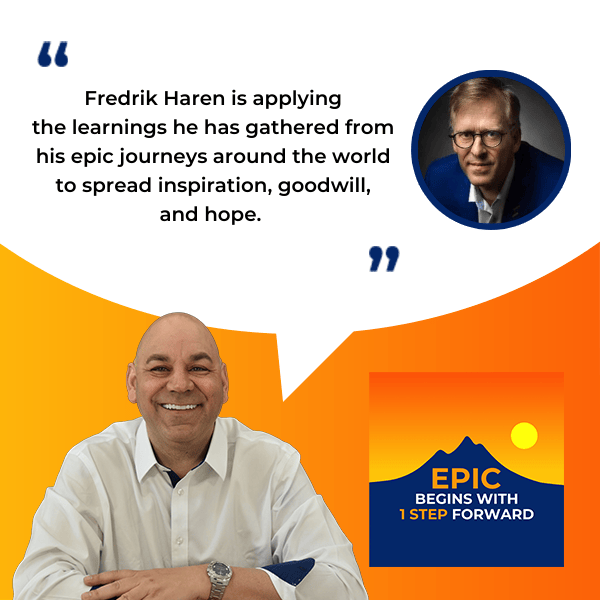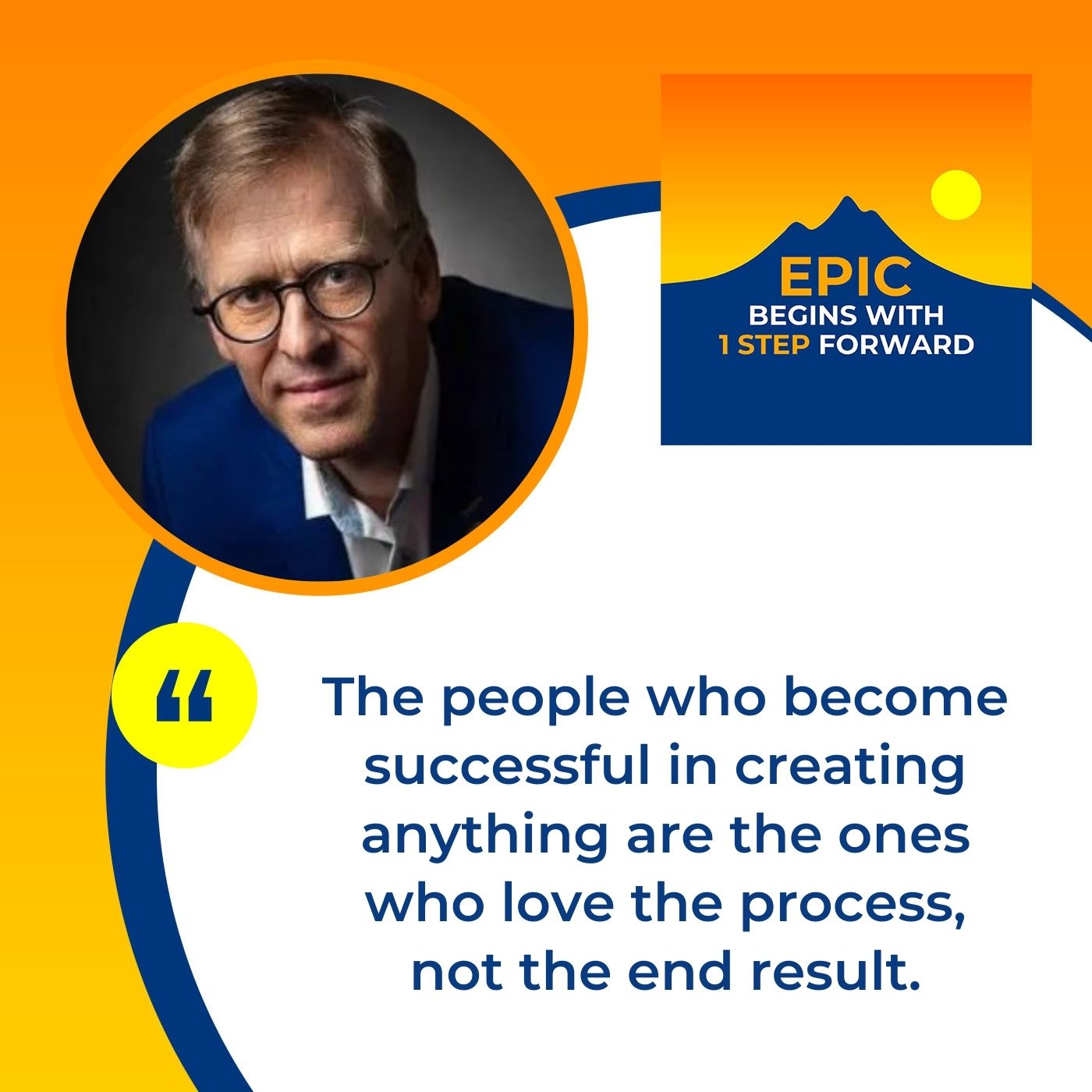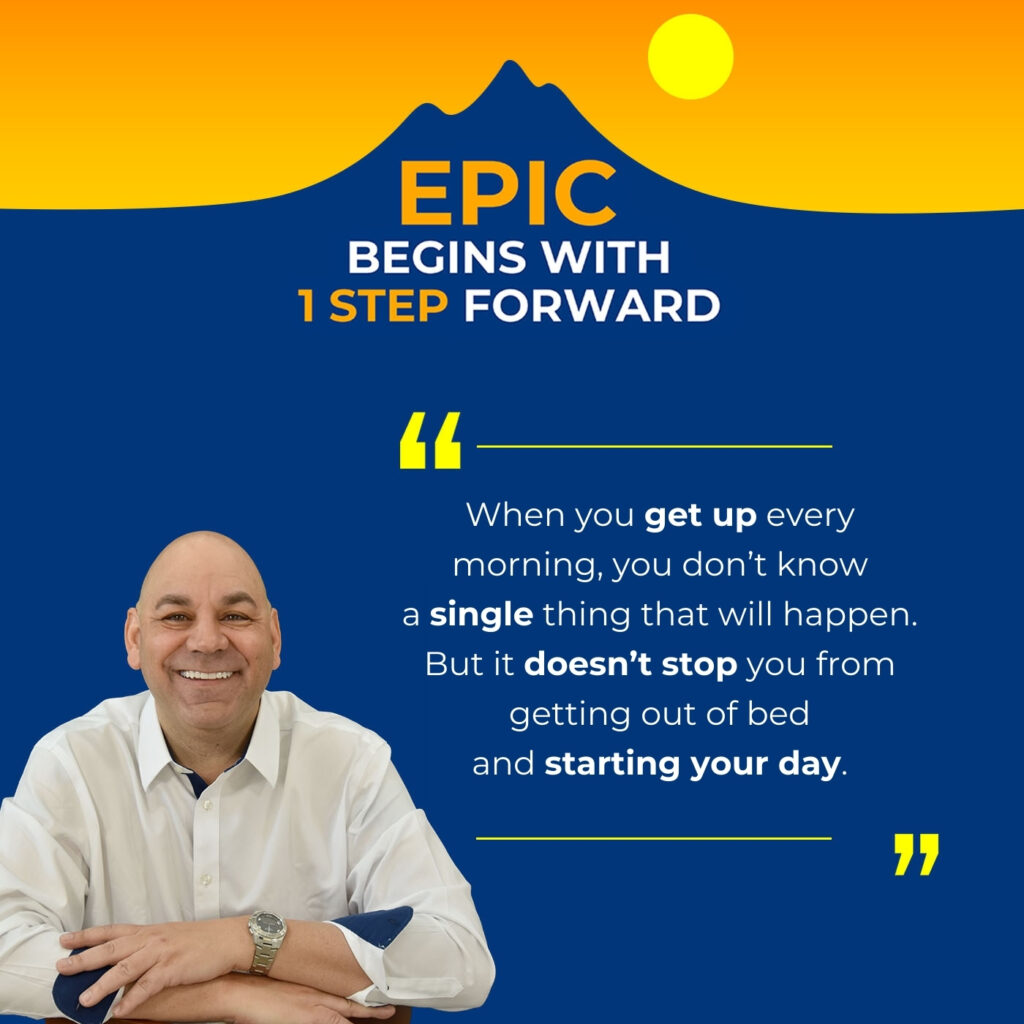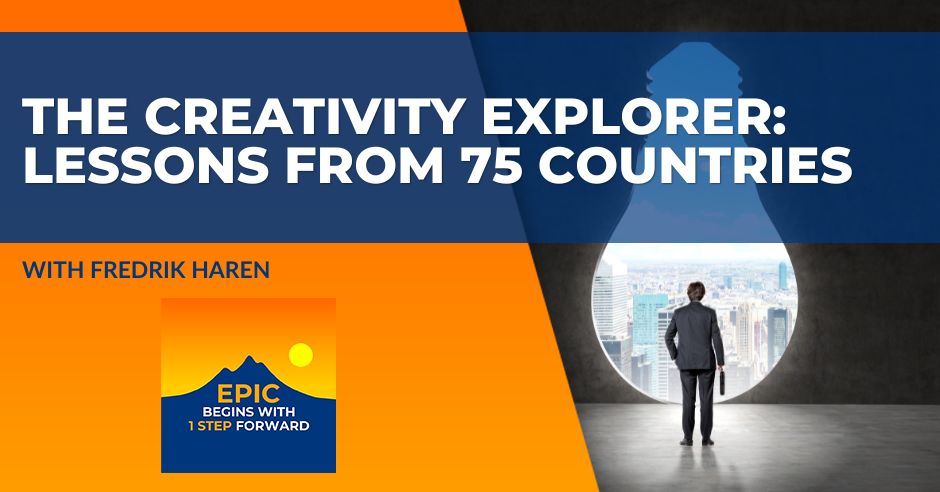Apply to be a Guest on My TV show
#EPICBeginswith1StepForward, #ZanderSprague, #CreativityExplorer, #EpicJourneys #TrueCreativity
—
Watch the episode here
Listen to the podcast here
The Creativity Explorer: Lessons From 75 Countries With Fredrik Haren
Studying And Experiencing Creativity
I am so very honored to be joined by Fredrik Haren. Fredrik, tell us who you are and what you do.
I’m The Creativity Explorer. That’s how I define myself. What does that mean? It means I travel around the world and interview creative people to try to understand the creative process. I’ve been doing it for 25 years. It’s a wonderful job because creativity is a wonderful thing to study.
How did you get into studying creativity and interviewing creative people?
The short answer, but the long time span, is that when I was a child, my father was a very creative musician. He played ten different instruments, so creativity was important. I was terrible at music. The message to myself was that creativity is clearly important, but I suck at it. It took me until I was in my twenties to realize that maybe I don’t have to be creative in music. I could be creative through other avenues. I got fascinated about the topic and decided, “This is going to be my journey. I’m going to study creativity because it is a skill that improves your life if you master it.”
I couldn’t agree more. I have to say I surprise myself sometimes with my creativity. Everyone has creativity. It’s about being open to discovering where that lies for you. It’s super fun.

I agree. By definition, creativity should surprise you because if it doesn’t surprise you, it’s not creative.
Meeting And Interviewing People Across 75 Countries
Who are some of the creative people that you like to say, “It was cool to meet that person.”
To put it in context, I interviewed people in 75 countries and probably thousands of people. My answer to that question is usually the last person I interviewed or one of the last few people I interviewed. I was in Edinburgh. I interviewed a famous jazz guitarist. Martin Taylor is one of the best in the world. He’s self-taught. When he plays the guitar, he’s actually not playing the guitar. He’s playing an imaginary instrument inside his head. By playing that instrument, it goes through his fingers, and then he plays the guitar.
We were talking about improvisation. We were also talking about this mental instrument that we all have. It’s one thing when you create, but then there’s another thing inside your head. It’s the engine that drives whatever we do. It’s the man behind the man. It’s the creativity machine that is inside our brains. We went deep. He’s one of the last people I interviewed. The whole idea is to interview a lot of different kinds of people in a lot of different industries. When you do this, you realize everyone has something to teach you about creativity.
I couldn’t agree more. Some of the creativity is being open. It’s like, “I have this idea in my head. Now, how do I bring that to fruition?” One of the things I’m proud of is that from the day my daughter was born, I started making up a song for her. It was not because I thought about it, but because when I was holding her, it popped into my head. I’m like, “Let me start to write words,” and then it grew from there.
The creative process is fascinating. As I talk with people about what their epic is and what these big things are that they go, “Someday, I’d like to,” I’m like, “Today is the day. Let’s go out and do it.” When it comes to creativity, sometimes, people put too many constraints on themselves. We’ll take that jazz guitarist. He taught himself. He clearly was like, “It doesn’t matter that I didn’t take lessons. I’m figuring this out.” He’s one of the best jazz guitarists in the world.
I like your story about the daughter because that was an idea that came to you. It wasn’t like, “I’m going to write a song to my daughter.” It came into your head. That’s a deficiency in the English language. We only have the word idea for both, like, “I’m going to make pancakes for lunch,” and, “Something is telling me to write a song to my daughter.” Those are very different mental experiences, but we call both of them an idea.
Creativity should surprise you. Otherwise, it is not creativity.
I interviewed a sculptor in Hong Kong. He separated it from mortal ideas, which are ideas that come from your mind. It’s like, “I’m going to make pancakes,” or, “I’m going to write a song for my daughter.” It could be divine ideas, like, “I have this urge. It seems like I need to write a song for my daughter.” It is a divine idea that comes from somewhere else, and you’re a vessel for it. Maybe we could call those also epic ideas.
We could. All too often, people say, “I don’t know how to do it perfectly.” You were saying that your father was a very accomplished musician, and you were like, “I can’t play an instrument. That’s not me.” Up until your twenties, you put that restraint. You were like, “I’m not creative if I can’t create music like my dad,” but that’s not at all the case. You’re right. Maybe you can’t play an instrument or create music, but there are so many other things that you’ve been able to create, which is great. Part of the reason I wanted you on is this whole idea of exploring creativity is cool.
The name The Creativity Explorer came from my son when he was eight years old. If someone asked him, “What does your father do?” He was supposed to say, “My father’s a creativity expert,” but he screwed it up. He said, “My father’s a creativity explorer,” which is a way better answer. An expert has all the answers, which is like, “I know creativity.” That’s boring. An explorer, by definition, doesn’t have the answers, but he has the questions.
The definition of to explore is to venture into unknown territory in order to learn more about something. By definition, you don’t have the answers, but you have an urge to find out. You’re an explorer. You’re on a journey. You want to discover something. When you’re on a journey, you’re moving forward. That’s when you want to learn. That’s when you’re curious. If you’re not on a journey somewhere, anywhere, then you should sit down and think about what’s wrong.
Loving The Process, Not The End Result
We’re all on multiple parallel journeys and stuff like that. My observation in having daughters and working with people of all ages is that younger people are so used to the quick solution. They’re like, “If I can’t get done this journey in a short period of time, it’s not worth it.” It’s that short attention span thing.
Throughout our lives, we go on these multi-year journeys. For example, going through school. When you start off, you start off in perhaps kindergarten or first grade. In the United States, you’re going up through twelfth grade, and then perhaps you’re going on to college or some other type of training. You don’t expect when you are six years old to go, “I’ll be done with high school in a month.”
One of the people I interviewed, at the time, was a student at the oldest brewery school in the world. It’s in Germany. It has been there since the 1500s. It’s 500 years old. He told me that there are two kinds of people who apply to this brewery school. Half of the people who apply love beer, and they like to drink beer, so they’re like, “Maybe I should learn how to make beer.” The other half loves the process of making beer, like the chemistry and all the chemicals. It’s a two-year course. He said that after 1 year, half of the people have dropped out, and almost all of them are from 1 of these 2 groups. Which group drops out?

The people who love beer?
Yeah, exactly, because they get bored with the process. It’s like, “Now, we’re going to learn about the chemistry of when this and that happened,” and they’re like, “I don’t care about that. It’s boring. I want to drink my beer.” They quit. The lesson here is that the people who become successful in creating anything are the ones who love the process, not the end result.
For example, I’m a speaker. I have coached hundreds of speakers. Some people come to me and say, “I love being on stage.” I say, “It’s great that you love being on stage, but you are not going to make it as a speaker, most likely.” The ones who make it as speakers are the ones who love the process of writing a speech, developing a speech, mastering the speech, and then going up and delivering the speech, learning from that, and becoming a better speaker every time. The ones who love the process of writing and delivering a speech are the master speakers, not the ones who love to be on the stage.
I do love being on stage, but I love the process of, “Let me come up with the idea, let me deliver it, let me master it.” Once I’ve mastered it, that’s where the fun begins, because that’s where I get to pay more attention to the audience and see what is landing and what is not landing. I’m like, “Maybe I will throw this extra story in because the audience is with me, and this story will help,” or, “This isn’t going too well. Let me cut that story, but add this story.” It’s that whole creative process of how I could change it. Every time I do a speech, there are the basics, but each speech is unique because I’m creative, and I can improvise on my feet and go, “How’s it going?” Speaking is fun.
The lesson here is that if you want to become good at something, you pick the lane where you love the process of that. Even when you fail, you are not going to care about it because you still learn something.
In my book, I talk about how failure is part of the journey. You’re not going to be 100% successful. Frankly, you start off, and you don’t have to know exactly how you’re getting to whatever your destination is. Every morning when you get up, you don’t know every single thing that’s going to happen in your day, and you don’t have the answer to every single question you’re going to get, but it doesn’t stop you from getting out of bed and starting your day. I find it funny sometimes when people go, “I can’t do this perfectly. I can’t paint.” I’m like, “When we learned how to write, it was a struggle to learn how to write an A, B, or C. You practiced enough. Now, you don’t have a lot of conscious thinking about how to do it.”

I was in Indonesia. I interviewed a musician there. He is one of the most successful Indonesian musicians and composers. When he introduced himself to me, he didn’t say, “I am a musician.” He said, “I am a student of music.” That’s how he defined himself. That makes all the difference.
Look at some of the professions that are apt. A doctor has a practice. A doctor, hopefully, is continually learning and going, “Now, I know this. Now, I can do this. I have this knowledge, and that allows me to now look and say, ‘Zander, the reason you’re losing your hair is this reason.’” Attorneys and doctors practice. I have a mental health practice. I’m certainly accomplished. I’m able to do therapy, but I’m constantly learning.
The True Meaning Of Epic And Creativity
It ties very well back to epic. I might put you on the spot here. I apologize.
Go, please.
I like to ask people who work in an industry or with a topic if they know the etymology of the topic that they work on. Do you know the etymology of epic?
Not exactly.
I think you do. You are aware of it. What would you say?
When I thought about epic, I was like, “What does epic stand for me?” I define it as every pilgrimage includes commitment. Meaning, if we’re doing something epic, we are on some kind of a pilgrimage to get to complete this task or to learn about whatever we’re doing, be it writing a book, running a marathon, or being a public speaker. It’s a process. It is a pilgrimage. It does require commitment to getting there.
The etymology of the word is not the pilgrimage or the journey. The etymology is story, as in a song or a story. It’s a story of a journey that someone is telling. It adds a level of meaning to the word. An epic is a story of an amazing journey. It’s not an amazing journey. It is not just that. It’s a story of an amazing journey. I interpret it as the story we tell ourselves.
An epic is a story of an amazing journey and the story we tell ourselves.
For example, when I decided to define myself not as a creativity expert, but as a creativity explorer, I’m telling myself the story of, “You are not just a creativity expert. You are a creativity explorer. You need to go and study creativity and ask people who have never been interviewed about creativity.” I went to Mongolia. I went to North Korea, and I interviewed people in North Korea. I need to explore creativity in places that I have never explored before. I’m telling myself a different story. This idea of what epic story we are telling ourselves about the journey we are on will affect our decisions.
I remember years ago, I was reading a book, and it was talking about this Buddhist monk who was working in the diamond industry in New York. It was a very fascinating story. The one piece of that that I’ve pulled with me over the years is that in Buddhism, there’s this idea that things are not inherently good or bad. It’s how we interpret what’s going on.
For example, the sun is out where you are, and you may go, “That’s great. The sun is out. That’s fabulous.” If you’re a farmer and there’s a drought, you may see the sun being out as a bad thing. The sun being out isn’t in and of itself a good or bad thing. It’s how we’re interpreting what’s going on. The same way that the stories that we tell ourselves, like, “This was good,” or, “This was bad,” define how we interact with that and move forward.
If you don’t mind, I’ll share this. You asked me before who was interesting. I was in Bhutan and interviewed Buddhist people about creativity. They gave me such an interesting perspective. One of the people I interviewed was the former Minister of Tourism in Bhutan. He said, “You Westerners think creativity is about self-expression. You are expressing yourself to the world. Self-expression is like, ‘Look what I’ve created here.’ That’s not the purpose of creativity. Creativity is not outward. It’s inward. Creativity is about understanding yourself on a deeper level.”
I heard that and said, “Wait a minute. This is so true.” Go back in your life and identify the most creative things you’ve done. I promise you that those things that you choose taught you something about yourself. I would even go so far as to say that if you didn’t learn anything about yourself when you created something, it wasn’t much of a creative process you were involved in.
I couldn’t agree more. That’s very true. It is exploring yourself and discovering that perhaps you are able to do something that you didn’t believe you could do. My readers, I say this all the time. I’m a talker, not a typer, and yet I’ve written three books. That, honestly, blows my mind because if you’d asked me in the university if I’d write a book, I’d be like, “Absolutely not. I hate writing.” I found a way to use my own creativity to create the books that I wanted to create. All of them are very personal journeys. How else can you write a book? It is a personal journey. You are as much the speech as the words that you’re saying.
Unfortunately, there are some people who have written books that have nothing to do with them. When you read these books, you realize, “This is such a boring book to read.” They wrote this book because they thought there would be a market for it, or someone told them to write it, or whatever the reason is. It’s meaningless. When you feel that someone is learning something about themselves while doing whatever that is, even if that’s a painting, a book, or whatever it is, you get, “This moves us.” The end product is also better if you did learn something about yourself in the process.
Chasing Divine Ideas In Your Dreams
By far, my best idea came to me in a nightmare in Thailand. At 2:00 AM, I woke up from a terrible dream. I dreamt of a whole movie or a whole story. As I woke up, I said, “This story is so amazing. I need to write it down.” I wrote it down, and it became a novel. It came out a couple of years ago. It’s called The Unvisible. That book taught me so much, not only about myself, but also my whole worldview about how I look at life. It was a message to myself in that dream. It was so powerful.
I certainly have had good ideas in the middle of the night, perhaps from a nightmare or whatever. Having something to jot down, at least the bare bones idea, so that when you wake up, you’re like, “Now I remember.” Sometimes, you were like, “I’ll remember that,” and then you wake up and think, “I had this brilliant idea, but now I have no idea.”
That happens.
How many creative ideas are still floating out in the ether? We had them come to us. Perhaps the vessel came to us, but we let it go. We’re like, “I’m trying to find it again.”
Those are the ideas we should chase. The divine ideas, the ones that are coming to us, are the most beautiful ideas.
I’ve certainly had a few of those middle-of-the-night ideas. I didn’t have a way to write it down, and then I’m like, “I regret that I couldn’t write it down because I know that was good.” You rack your brain and go, “What was it? I know it’s in there.”
I interviewed one guy once. He is a Swiss watchmaker. He is one of the most famous in the world. He had this amazing dream. He had a mental breakdown. For 6 months or something, he slept 15 hours a day. He didn’t work. He was burned out. As soon as he woke up, he ate and watched Star Trek, the series, for 9 hours straight, and then went back to sleep and slept for 15 hours again.
He slept and watched Star Trek for weeks. Finally, in the middle of the night, he dreamt of a three-dimensional watch inspired by the solar system. He woke up and started creating the watch, and then he got stuck. Everyone said to him, “That’s too bad because this is such a creative watch.” He said, “Don’t worry about it. I’ll go back to my dream.”
He went back to sleep, came back to the same dream again, and saw what he had misunderstood. He woke up again, fixed it, and created his watch. This watch was awarded the most innovative watch in the world when it came out. It’s amazing. It’s three-dimensional. All the pieces are moving like planets around the sun. The idea of going back to sleep and going back to the same dream again to solve the problem he couldn’t solve in his conscious mind is crazy.
Fredrik’s Not Yet In Life
One of the things that I love to ask my guests is, I love the concept of not yet, those things that we want to do, but we haven’t done. We hold out the hope that we’re going to get to it. Even if we don’t, we are still leaving the door open that it’s possible. For you, what are 1 or 2 of those not-yets? If you have more, that’s fine.
I mentioned the novel. That came to me a couple of years ago. It took me ten years to finish the novel. I had no intention of being an author of fiction books, but it took me ten years to get it out. It came out on Penguin. It became number one on Amazon in Singapore. Of the 15 million books, I was number 1, which is very rare.
Good for you.
Then, it tanked. That was never my goal. My goal is a Netflix series. This is a book about invisible people. There exists in the world a different human race. It’s like us, except it’s invisible. It’s like this. It’s like transparent humanity. We can’t see them, but they can see us. That’s the plot and the scenario. I know this is going to become a Netflix series. I have no stress about it because the whole idea of writing this book is not my book. I didn’t even want my name on it. I wanted it to say, “As told to Fredrik Haren,” not, “By Fredrik Haren,” because this was given to me as a gift.
The book was going to come out when it wanted to come out. The series will be made when the series decides that it’s time to make it. I am patiently waiting for someone from Netflix to call me. I am also consciously taking steps to make it happen, but not stressfully. I don’t care if it takes 25 years. It’ll happen. I know.
That’s great. It’s like, “I’m trying to push it forward, but if it’s not today, then not yet.”
I wouldn’t even use the word push. I’m flowing with it because it has momentum on its own. I’m not in charge of it. The universe is in charge of it, but I will guide it. When I don’t get to guide something, I will do my part. I will move it a little bit.
Just go with the flow. Life has a momentum of its own. You are not in charge of it; the universe is.
That is awesome. I wish you all the luck with that. Certainly, getting a Netflix series is a monumental task, but I believe it’ll happen for you.
It’s getting number one on Amazon. I did that, but as I said, this is not my project. I’m just the custodian of it.
Get In Touch With Fredrik
How can people get a hold of you?
Google The Creativity Explorer and, hopefully, I will come up.
I want to thank you so much for joining me. This was an epic conversation. This was so fascinating. I’ve learned a lot. Thank you.
Thank you. You have a wonderful topic for a show.
Thank you so much. I do enjoy it, so that’s a good thing. I want to remind everyone that if you’re ready to begin your epic journey, go to EpicBegins.com. As always, remember, epic choices lead to the epic life that you want.
Important Links
About Fredrik Haren
 Help your audience become more creative. Everyone wants to become more creative – but how can we discover our full creative potential? That is the question that has pushed Fredrik Haren to travel to over 75 countries on six continents over the last 25 years. He is The Creativity Explorer.
Help your audience become more creative. Everyone wants to become more creative – but how can we discover our full creative potential? That is the question that has pushed Fredrik Haren to travel to over 75 countries on six continents over the last 25 years. He is The Creativity Explorer.
Fredrik has interviewed hundreds of business leaders—from heads of innovation to CEOs — and traveled the world to interview thousands of creative people from all walks of life, from glass artists in Barcelona to Nomads in Mongolia.
He even went to learn about creativity from the people in North Korea! He has learnt about creativity from the children in the slums of Mumbai as well as from the most famous watch makers in Switzerland – and everything in-between. His book “The World of Creativity” comes out globally on Wiley in November 2025.

